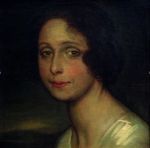Margarita Nelken Mansberger
Biography
Margarita Nelken Mansberger was born in Madrid in 1896. A writer and Spanish politician, she was one of the representatives of the emerging feminist movement in Spain during the 1930s.
Known for her determined political activity during the Second Republic and the Civil War, Margarita Nelken also excelled as an art critic, journalist and writer from a very young age. The daughter of a French woman and a Spanish jeweller, both descendants of German Jews, she undertook the first translation of Kafka into Spanish.
Concerned about the situation in Spain, in 1919, she published her first long work, “The Social Condition of Women in Spain” (La condición social de la mujer en España). In 1931 she joined the PSOE (Spanish Socialist Workers’ Party) and participated in the October 1931 by-elections as a candidate of the Badajoz Socialist Group (Agrupación Socialista de Badajoz). Elected that year, and again in November 1933 and February 1936, she was the only woman to obtain three parliamentary elections during the Second Republic.
She was opposed to granting women the right to vote in 1931, a stance she shared with Victoria Kent. She maintained that the lack of maturity and social responsibility of Spanish women would jeopardise the stability of the Republic, since a very high percentage of women, prior to voting, would consult with their confessor. She founded Spain’s first day-care centre for working mothers in the Ventas district of Madrid. In 1934 she joined the National Committee of Women against War and Fascism (Comité Nacional de Mujeres contra la Guerra y el Fascismo) and after the revolution in October her parliamentary immunity was removed and she was sentenced to twenty years in prison. She fled to France and set up in Paris, and then visited different Nordic countries, later spending almost a year in the Soviet Union. She returned to Spain in time to take part as a socialist candidate for the Popular Front (Frente Popular) in the 1936 February elections. In November 1936, she took part in the siege of Madrid and also became renowned for organising the Association of Anti-fascist Women (Unión de Mujeres Antifascistas). She joined the PCE (Communist Party of Spain) in November 1936, spent the last part of the Civil War in Barcelona and was the only Member of Parliament present at the last meeting of the Republican Assembly on Spanish soil, held in February 1939. She then went to Paris and, at the end of 1939, to Mexico, where she worked in the Secretariat of Public Education (Secretaría de Educación Pública), collaborated with the Republican government while in exile, participated in the activities of the Association of Spanish Women (Unión de Mujeres Españolas), and continued her literary and journalistic work. In October 1942 she was dismissed from the PCE after criticising the communist policy of the National Union (Unión Nacional). During 1948 she travelled around Europe, holding conferences on Latin American art in Amsterdam and Paris. She was one of the most respected and influential art critics in Mexico until her death in 1968.
Chronology
1896 5th July. Born in Madrid.
1911 Publication of her first article in the magazine The Studio.
1919 Birth of her daughter Magdalena Nelken. She publishes La condición social de la mujer en España (The Social Condition of Women in Spain).
1923 She publishes La aventura de Roma (The Roman Adventure) and la Trampa del arenal (The Sand Trap).
1926 Maternología y puericultura (Maternology and babycare). She contributes to the magazine Blanco y Negro.
1931 12th April: The Second Republic. Elected as a Member of Parliament by the PSOE. La mujer ante las Cortes Constituyentes (Women before the Constituent Cortes).
1936 16th February, victory of the Popular Front. 18th July, Military uprising of Franco. The Civil War begins. In December she joins Spain’s PC.
1938 Publishes La mujer en la URSS y en la Constitución Soviética (Women in the USSR and in the Soviet Constitution).
1939 End of the Civil War. Exile in France and Mexico.
1942 Dismissed from the PC. Publishes a new edition of Tres tipos de Vírgenes (Three types of virgins), Angélico (Angelic), Rafael and Alonso Cano in Mexico.
1943 She publishes Las torres del Kremlin (The Kremlin Towers).
1948 Year-long trip around Europe.
1956 Death of her daughter Magda.
1957 Elegía para Magda (Elegy for Magda).
1964 El expresionismo en la plástica mexicana (Expressionism in Mexican plastic arts).
1965 Collaborates with international newspapers and seminars.
1968 She dies in March in Mexico.
In 2010, Margarita Nelken’s name was removed from a street in Badajoz that was dedicated to her when democracy arrived. As explained by Rosa REGÁS in an article: “ethical confusion between the biographies of those who defended the legally established government and those who overthrew it”.
Sources of information
- Josebe Martínez Gutiérrez (1997): Margarita Nelken (1896-1968)
- Pablo Iglesias Foundation. Fundación Pablo Iglesias. http://www.fpabloiglesias.es/archivo-y-biblioteca/diccionario-biografico/biografias/13645_nelken-mansberger-margarita
Photo source
- Julio Romero de Torres. Public Domain (Photo of an artwork, PD in those countries with a copyright term of life of the author plus 80 years or less). Wikimedia Commons. http://commons.wikimedia.org/wiki/File:Margarita_Nelken_by_Julio_Romero_de_Torres.jpg.




